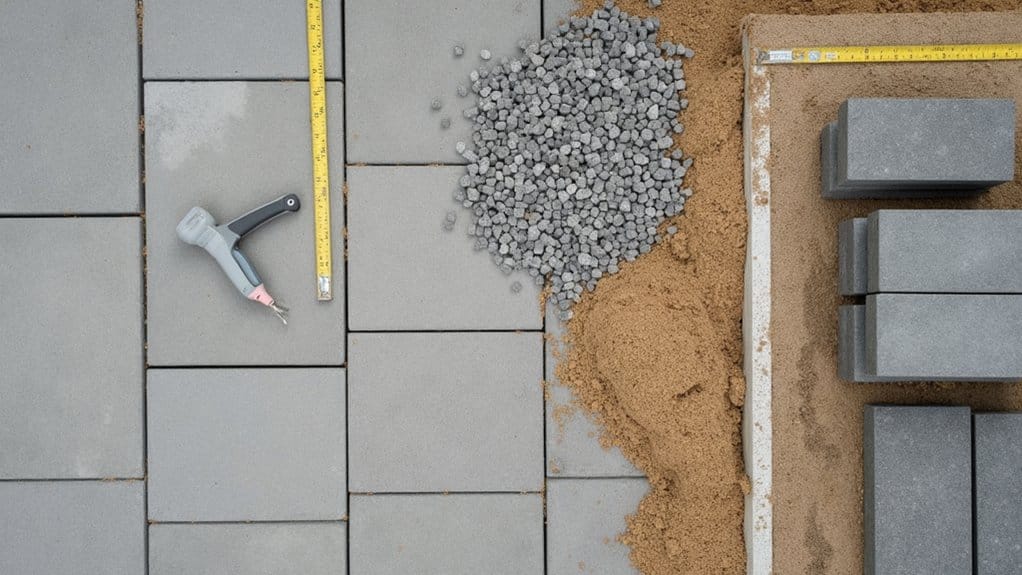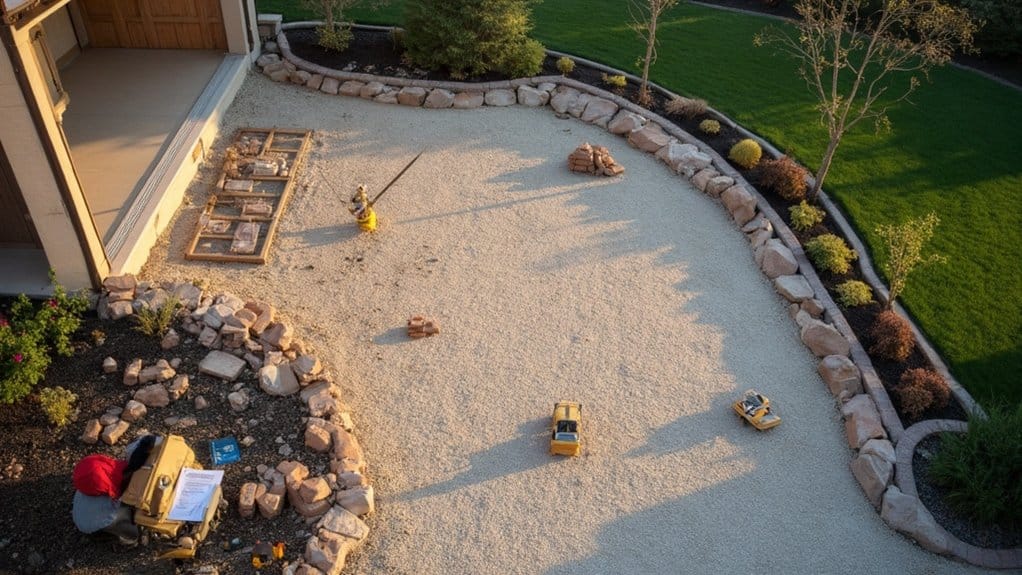Paving projects require smart budgeting and careful planning! Expect to spend $2-8 per square foot for basic materials like asphalt or concrete. You’ll need to factor in labor costs of $25-45 per hour plus equipment rentals around $200-400 daily. Save money by getting multiple quotes and scheduling during off-peak seasons. Don’t forget to add 15-20% for unexpected expenses. Our complete guide reveals even more ways to maximize your paving investment.
Key Takeaways
- Compare material costs carefully, as asphalt costs $2-5 per square foot while concrete ranges $4-8 and natural stone $15-30.
- Add 10% to your measurements for waste and obtain multiple contractor quotes to ensure competitive pricing.
- Plan for 15-20% contingency funds to cover unexpected repairs, weather delays, and potential permit fees.
- Schedule paving during off-peak seasons and consider bulk material purchases to reduce overall project costs.
- Account for equipment rental fees, including pavers ($200-400) and roller compactors ($150-250) in daily operational costs.
Understanding Basic Paving Costs and Materials

Paving costs vary dramatically based on your choice of materials and project scope.
Let’s examine your main paving materials options and their typical price ranges!
Asphalt
- Most affordable at $2-5 per square foot
- Perfect for driveways and parking lots
- Lasts 15-20 years with proper maintenance
Concrete
- Mid-range at $4-8 per square foot
- Ideal for sidewalks and patios
- Durable with a 20-30 year lifespan
Natural Stone
- Premium choice at $15-30 per square foot
- Creates stunning walkways and courtyards
- Can last 50+ years when installed correctly
Cost variations depend on:
- Your location and labor rates
- Site preparation needs
- Project size (larger jobs = lower per-foot costs)
- Material quality and finish options
Get multiple quotes to compare prices!
Each contractor may have different material sources and overhead costs. Additionally, partnering with a full-service paving company ensures access to a range of options and expertise throughout your project.
Calculating Square Footage and Project Scope
Now that you know your material options, let’s map out your project’s size!
Measuring your paving project‘s square footage is easier than you think. Simply multiply the length by width of your space in feet. For irregular shapes, break the area into rectangles and add them together.
Quick Tips for Accurate Measurements:
- Use a long measuring tape or wheel measurer
- Add 10% extra for waste and cuts
- Mark boundaries with spray paint
- Consider slopes and drainage needs
Don’t forget these key project scope factors:
- Vehicle weight requirements
- Access points and connections
- Underground utilities
- Soil conditions
- Timeline constraints
Pro tip: Take measurements twice! A small miscalculation can impact your entire budget. Many contractors offer free measuring services – take advantage of their knowledge. Additionally, paving services offered can help you choose the right materials and techniques for your specific project needs.
Labor and Equipment Cost Factors

When planning your project’s budget, labor and equipment costs often exceed material expenses.
You’ll need to account for several key factors that impact your bottom line.
Labor Costs
- Skilled workers command $25-45 per hour
- Most projects require 3-5 workers minimum
- Labor efficiency varies by project complexity
- Weather delays can increase labor hours
Equipment Needs
- Paver rental: $200-400 daily
- Roller compactor: $150-250 daily
- Dump truck fees: $75-100 per hour
- Tool and safety equipment: $100+ daily
Pro Tips:
✓ Book equipment rental during off-peak seasons
✓ Schedule crews for consecutive days
✓ Bundle equipment rentals for better rates
✓ Consider weather forecasts to avoid costly delays
Remember: Getting quotes from multiple contractors helps you understand typical labor and equipment rates in your area. Additionally, obtaining a fast, free quote can provide insights into labor and equipment costs specific to your project needs.
Hidden Expenses and Additional Considerations
Beyond the obvious costs, several sneaky expenses can derail your paving budget!
Let’s examine the hidden factors you need to take into account before starting your project.
1. Unexpected repairs can pop up during site preparation.
Old drainage systems might need fixing. Soil stability issues could require additional foundation work.
Plan for a 15-20% contingency fund!
2. Project delays due to weather conditions can increase labor costs greatly.
Rain delays could stretch your timeline by 3-5 days. That means more equipment rental fees and worker hours.
3. Permit fees and inspections might catch you off guard.
Local regulations often require multiple inspections at $200-500 each. Some areas demand special environmental assessments too.
Don’t let these hidden costs surprise you!
Build them into your budget from day one. Smart planning now saves major headaches later. Additionally, consider the potential pothole repair costs associated with unforeseen damages to your pavement surfaces.
Money-Saving Strategies and Cost-Cutting Tips

Smart budgeting helps offset those sneaky expenses we just covered.
Let’s explore powerful money saving techniques that’ll keep your paving project affordable!
Time Your Project Right
- Schedule during off-peak seasons (late fall/early winter)
- Get multiple bids in advance – aim for at least 3 quotes
- Book early for better contractor rates
Smart Project Budgeting
- Buy materials in bulk when possible
- Share delivery costs with neighbors
- Consider recycled materials – they’re 30-40% cheaper
- Break the project into phases if needed
Maximize Value
- Choose standard finishes over premium options
- Handle simple prep work yourself
- Ask about contractor discounts
- Request price matching from suppliers
- Consider permeable pavers for stormwater benefits and potential tax incentives
Additionally, seal coating is a crucial investment that can significantly extend the lifespan of your pavement and reduce future repair costs.
Every dollar counts!
These strategies can save you 15-25% on your total project cost.
Financing Options and Payment Planning
Paying for your paving project doesn’t have to drain your bank account! Smart financing alternatives can help you manage the cost while getting the quality results you deserve.
Let’s investigate your exciting payment options!
- Traditional Bank Loans – Get competitive interest rates through your local bank or credit union. They’ll often offer terms between 3-7 years to keep monthly payments manageable.
- Contractor Payment Plans – Many paving companies provide flexible payment schedules! You can spread costs over 6-18 months, sometimes with zero interest for qualified buyers.
- Home Equity Options – Tap into your home’s value with a HELOC or home equity loan. These often have lower interest rates than personal loans.
Additionally, trusted asphalt paving services can guide you in understanding the full scope of your project to help plan your budget effectively.
Remember to get everything in writing!
Compare different financing terms carefully. You’ll want to understand all fees and payment obligations before signing any agreements.
Conclusion
Your paving project’s success comes down to smart planning and savvy budgeting. While upfront costs might feel overwhelming, proper research and strategic decisions will protect your investment. You’ll maneuver between premium materials and budget-friendly alternatives, between DIY savings and professional knowledge. Take control of your project today – your dream driveway or patio awaits! Remember: great paving doesn’t just change your property – it raises your home’s entire value.



